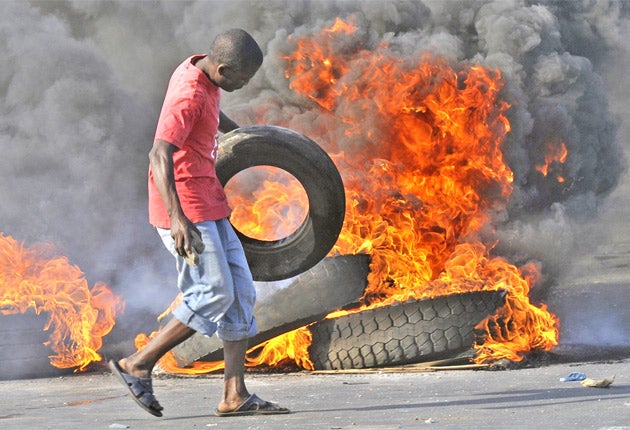Seven killed as rising food prices spark riots in Mozambique

Young men rampaged through Maputo, Mozambique's capital, yesterday, throwing stones, looting shops and drawing police fire that killed at least seven people. The violence was triggered by the rising cost of food, fuel and water.
Rising prices around the world have raised concerns about a return to the political instability of 2008, when Haiti, Kenya and Somalia were among impoverished countries that saw riots over the cost of living.
Egypt, where rioting also broke out in 2008, has in recent months seen protests over rising food prices. The UN said Wednesday that international food prices have soared to their highest in two years.
Mozambican police had declared Wednesday's marches in Maputo illegal, saying no group sought permission for them. For days, word of the protests had been spread, in some cases by text messages, in the former Portuguese colony in south-east Africa. Thousands of people, mostly young men, turned out.
"This strike is about the hike in prices. More than that, it's about injustice," said one protester, 34-year-old Albino Mkwate.
Parts of the capital descended into chaos, with women crying about the violence and protesters running through the streets carrying the wounded. A boy of 12 could be seen lying motionless on a Maputo street in a pool of blood.
Horatio Antonio, a 45-year-old unemployed man, said he saw police open fire on protesters without provocation.
"People are angry because prices are going up: petrol, rice, water, electricity, everything," Mr Antonio said.
One witness described a women running along the road to the airport after the riots, rubbing her stomach and saying: "We are hungry, all Mozambicans are hungry."
State television said police shot and killed seven people, including a girl of about six who was on her way home from school and another girl whose circumstances of death were unknown.
Alice Caisane, a Maputo hospital medical chief, told state TV that four of the victims died at her hospital and 16 were treated for gunshot injuries.
Pedro Cossa, a spokesman for the police ministry, said he had heard the TV and radio casualty reports, but he was still awaiting word from officers. He said police had fired both rubber bullets and live rounds, and at times had been under attack by protesters.
While there were no calls for more protests, Mr Cossa said he feared unrest would continue.
Mozambicans have seen the price of a loaf of bread rise by 25 per cent, from four to five meticais (from about 11 cents to about 13 US cents) in the past year. Fuel and water costs also have risen.
The UN Food and Agriculture Organisation (FAO) said yesterday its global food price index shot up 5 per cent between July and August.
The FAO's Abdolreza Abbassian said there are sharp differences between the current price situation and the spring of 2008, when high oil prices and growing demand for biofuels pushed world food stocks to their lowest levels since 1982.
The FAO recently further cut its forecast for 2010 world wheat production since its last update on 4 August, putting this year's wheat crop at 648 million tons, down 5 per cent from 2009 but still the third-highest ever. This reflects a cut in drought-hit Russia's harvest estimate from 48 million tons to 43 million tons, more than offsetting higher forecasts in the US and China.
Some critics say bad government decisions are making shortages worse and accuse producers of colluding to push up prices.
Mozambique's Frelimo party, in power since independence from Portugal in 1975, has been plagued by charges that its government is corrupt and inefficient.
In 2008, after a week of clashes between police and rioters that killed at least four people and injured more than 100, the government cut fuel prices.
Mozambique was left in ruins by a civil war that broke out after independence from Portugal in 1975 and lasted for 17 years. Aids, outbreaks of cholera and frequent natural disasters strain the government's resources. More than half the population lives in poverty, and Mozambique ranks 175th of 179 countries on the UN Human Development Index, a measure of progress that takes into account health and education levels as well as income.
Subscribe to Independent Premium to bookmark this article
Want to bookmark your favourite articles and stories to read or reference later? Start your Independent Premium subscription today.

Join our commenting forum
Join thought-provoking conversations, follow other Independent readers and see their replies